المراقبة والتقييم
لا تتعلق معظم تحديات الرصد والتقييم، مثل الافتقار إلى الاستثمار والقدرات الكافية، تحديدًا بالمساعدات النقدية والقسائم. لكن تلك التي تتعلق في المقام الأول برصد نتائج عمليات النقل غير المقيدة. ويمكن أن تجعل مرونة التحويلات النقدية من الصعب تحديد مؤشرات النتائج المناسبة، لأنها قد تتضمن مجموعة من المؤشرات القطاعية والشاملة. وفي الوقت نفسه، هناك قيود على جمع بيانات دقيقة حول كيفية إنفاق التحويلات النقدية.
التزم الموقعون على الصفقة الكبرى بضمان وجود آليات الرصد والتقييم ذات الصلة فيما يتعلق بالنقد، وزيادة فهم التكاليف والفوائد والآثار والمخاطر المتعلقة بالنقد بالنسبة للطرائق الأخرى. بناءً على ذلك، يحتوي مسار الصفقة الكبرى على نقاط عمل بما في ذلك تطوير مؤشرات نتائج مشتركة للمساعدات النقدية متعددة الأغراض، ومقاييس لتحليل القيمة مقابل المال. تم تقييد التحليل المنهجي للقيمة مقابل المال بسبب عوامل تشمل عدم وجود نهج متفق عليها، والحاجة إلى بيانات نتائج عالية الجودة، وطبيعة التحليل.
الأولويات الحالية
في إطار الالتزامات النقدية للصفقة الكبرى، شاركت شبكة CALP (مع الوكالة الأمريكية للتنمية الدولية وخدمات الإغاثة الكاثوليكية) في تطوير مؤشرات النتائج للمساعدات النقدية متعددة الأغراض. وتُتاح مسودة الاختبار حاليًا باللغات الإنجليزية والفرنسية والإسبانية عبر مكتبة شبكة CALP.
Related initiatives
Featured content

Multipurpose Cash Outcome Indicators – Final Draft for Testing
Guidelines and Tools
Note that the MPC indicators have now been revised. Please click here to access the updated Multipurpose Outcome Indicators and Guidance, which is available in Arabic, English, French and Spanish. Multipurpose Cash Outcome Indicators – Final Draft for Testing Multipurpose cash (MPC) is a type of assistance intended to enable people to meet their basic needs through local...

Monitoring 4 CTP: Monitoring Guidance for CTP in Emergencies
Guidelines and Tools
This guidance provides a central resource to promote a common understanding of the most important monitoring considerations for humanitarian projects using cash transfer programming (CTP). The primary audience for this guidance is field-level practitioners, from organisations directly involved in the design, implementation, monitoring, and accountability of projects using cash and vouchers...

Cost-Efficiency Analysis of Basic Needs Programs: Best Practice Guidance for Humanitarian Agencies
Guidelines and Tools
The Efficiency, Effectiveness and Value for Money Sub-Workstream is pleased to share the final output on Cost-Efficiency Analysis of Basic Needs Programs: Best Practice Guidance for Humanitarian Agencies (attached).
Cost-efficiency analysis estimates the ratio of program costs to outputs created, allowing you to compare cost-per-output for programs which all produced the same output. Such...
Thematic lead
Latest

Multi-Cluster/Sector Initial Rapid Assessment (MIRA)
Report
The immediate aftermath of a sudden-onset disaster is a critical period of time when the humanitarian and donor communities need to make key decisions on how to best support the affected country or region and its populations. However, during that brief period, limited comprehensive information on the...
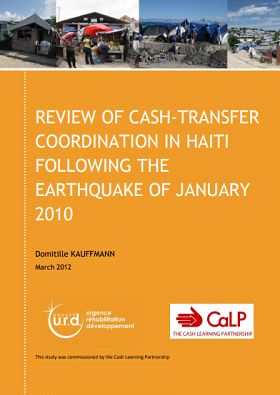
Review of Cash-transfer Coordination in Haiti following the Earthquake of January 2010
Case Study
This study, commissioned by the CALP Network, aims to review and document the coordination of cash transfer programmes (CTP) implemented from the emergency phase in Haiti. It is part of a wider review of CTP coordination in emergency situations which includes three case studies (Pakistan, Haiti and the...
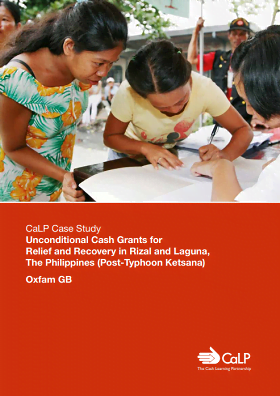
Unconditional Cash Grants for Relief and Recovery in Rizal and Laguna, The Philippines (Post-Typhoon Ketsana)
Report
In response to rapid onset flooding in Laguna and Rizal provinces in the Philippines, Oxfam International implemented a Cash Transfer Programme (CTP) in three phases: 1) Unconditional cash transfers for individuals to provide for basic needs; 2) Conditional cash transfers for individuals resuming income...

ICT/mobile Phone Technology: A shift in the right direction
Blog Post
Thirteen African nations came together for the AgriKnowledge Share Fair in Addis Ababa at the end of October 2012 to learn about approaches for quicker and more efficient humanitarian response. Government representatives, researchers, UN agencies and NGOs gathered for a three day symposium on best...
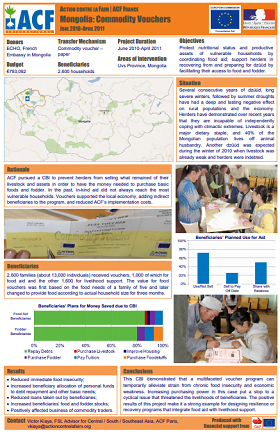
ACF Mongolia Commodity Vouchers (Poster)
Report
This one-page poster provides an overview of ACF’s commodity voucher programme in Mongolia.
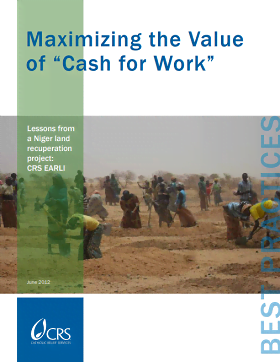
Maximizing the Value of "Cash for Work": Lessons from a Niger land recuperation project
Report
The good practices in this publication were distilled from a Real Time Evaluation (RTE) of an emergency project in Niger, implemented by Catholic Relief Services (CRS) and financed by OFDA that is using cash for work and seed fairs to address food insecurity in the departments of Ouallam and...

Cash transfer programming in urban emergencies: a toolkit for practitioners
Guidelines and Tools
In recognition of the increasing urban populations around the world and their increasing vulnerability to disasters, the the CALP Network endeavored to investigate the current status and impact of urban emergency response programs that utilise cash transfer programming. This study aims to better...
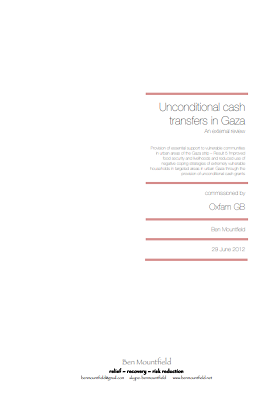
Unconditional cash transfers in Gaza: an external review
Report
This is a review of small pilot project, which targets extremely vulnerable households with monthly unconditional cash transfers for a limited period. The target population is made up of two groups, one group already receiving assistance through a voucher from WFP but still showing poor food diversity...

Cash Transfers in Nairobi’s Slums
Report
In Kenya, a combination of factors led to the food crisis of 2008–9, which put around 9.5 million people at risk of starvation. About 4.1 million of those affected were living in informal settlements (slums) in the capital, Nairobi. Oxfam and Concern Worldwide developed a joint programme to address...

Cash and Shelter: A Workshop on Using Cash Transfer Programming for Emergency and Early Recovery Shelter
Presentation
A power point presentation to provide guidance to programme managers, programme implementers and programme support staff when selecting cash as a potential response tool in emergency shelter programmes.
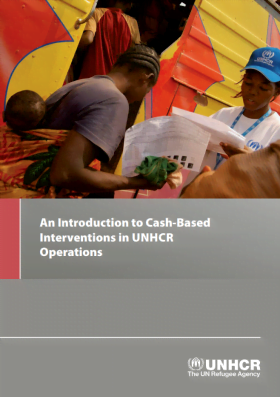
An Introduction to Cash-Based Interventions in UNHCR Operations
Policy paper
This document provides an introduction and basic guidance on the use of cash-based interventions and tackles key issues of relevance to UNHCR in the form of questions and answers. It also provides an overview of UNHCR’s experience in using cash-based interventions.
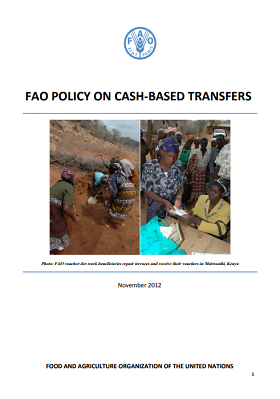
FAO Policy on Cash-Based Transfers
Report
This document articulates FAO’s roles with respect to supporting and implementing CTs linked to agriculture and food security in line with the Organization’s mandate and comparative advantages. It is based on FAO’s experience and expertise in supporting CT programming and details various CT...

Mobile Technology in Emergencies
Policy paper
Mobile phones are increasingly accessible to those affected by crisis and can play a strategic role in the delivery of rapid, cost-effective, scalable humanitarian assistance. However, the full potential of mobile phones to work as transformative tools in emergency response has not yet been realised. This...

How to Conduct a Trader Survey?
Guidelines and Tools
The purpose of this technical guidance sheet is to provide guidance to WFP Country Office and partner staff in conducting a simple trader survey with limited or no external technical support. For complex trader surveys, or in situations where local capacity is insufficient, experienced WFP staff in the...

Cash Transfer Programming in Urban Emergencies: Tools (Annex 2)
Guidelines and Tools
This file contains the following tools referenced as Annex 2 of the the CALP Network Urban Toolkit:
1. Sample Focus Group Discussion Questionnaire to Establish Urban-Specific Vulnerability Criteria
2. Sample Urban Household Survey
3. Template in PowerPoint of Commodity Market Map
4. Template in PowerPoint...

MPESA Project Analysis: Exploring the use of cash transfers using cell phones in pastoral areas
Report
Safaricom Limited, a mobile network operator in Kenya, launched a mobile money transfer system called M-PESA in 2007. This system allows users to send or receive money on their Safaricom SIM card. Télécoms sans Frontières and Vétérinaires sans Frontières – Germany decided to work in partnership on...

Examining Differences in the Effectiveness and Impacts of Vouchers and Unconditional Cash Transfers
Report
The objective of this study is to examine the differences in the effectiveness and impacts of vouchers versus unconditional cash transfers in the Bushani camp of the Masisi territory of the Democratic Republic of Congo. As part of this research, the study team collected household data from over...
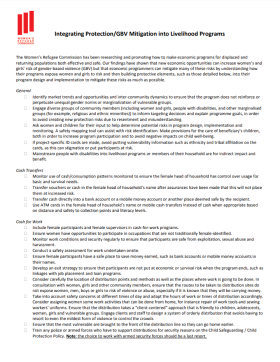
Integrating Protection/GBV Mitigation into Livelihoods Programmes
Guidelines and Tools
The Women’s Refugee Commission has been researching and promoting how to make economic programs for displaced and returning populations both effective and safe. Our findings have shown that new economic opportunities can increase women’s and girls’ risk of gender-based violence (GBV) but that...
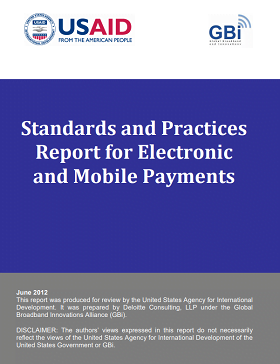
Standards and Practices Report for Electronic and Mobile Payments
Report
The benefits of new electronic and mobile payment methods in support of USAID objectives to better serve the unbanked have been well-documented in other literature, 2 and that case will not be reiterated in this report. A practical strategy for evaluating an individual program or Mission environment for...
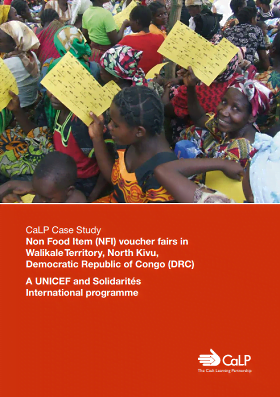
Non Food Item (NFI) Voucher Fairs in Walikale Territory, North Kivu, DRC (the CALP Network Case Study)
Case Study
In response to a rapid-onset emergency, UNICEF and Solidarités International utilized a cash-based voucher approach in Nyasi and Bobolo villages, in Walikale Territory, North Kivu, Democratic Republic of Congo (DRC). As part of a larger multi-province, multi-partner response programme in DRC known as...
